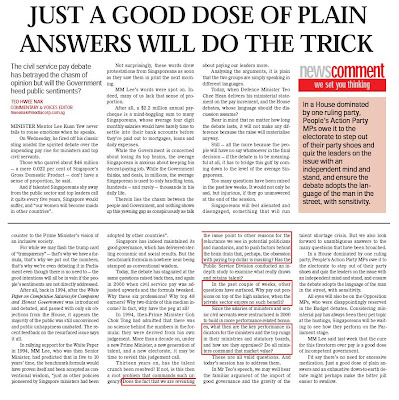Paying the Piper: The great Singapore civil servant salary debate

No one can dispute the need to pay the top performers the market rate. But to the Average Joe on the street, the question is... how sure is he that the top civil servants would have been top performers in the private sector?
Most of the '30-something year old entry-level superscalers' would have entered the civil service directly from school. They've never seen even one day of private sector service. And guess what?... the private sector is quite different from the civil service in terms of job security, stress, pressure and competitiveness. How do we convince the public that a high flying civil servant would have been flown just as high in a privatised sky? How can they be convinced that a top politician would have been a top entrepreneur or business person?
The public has also been told there is an issue with high rates of resignations, which makes these pay hikes necessary in the first place. And these resignations are draining top brains and talent from the civil service into the private sector and overseas. No offense but by definition, wouldn't that make the ones who stayed back... of somewhat lesser quality compared to the top performers who have apparently already left?
But at the end of the day, nobody would begrudge good pay for good work. And therein lies the crux of the issue. While salary benchmarks are transparent, the performance benchmarks are NOT as well publicised. Essentially, the public must be informed of exactly what a top civil servant achieved each year, relative to clearly stated targets - in order to be considered equivalent to a top private sector performer.
Perhaps the bulk of the pay package should be directly tied to private sector salary growth or better yet, middle and lower income salary growth. Increases in standards of living, decreases in costs of living, income per capita, better healthcare, lower unemployment, reducing the lower income gap etc are also good performance determinants. Perhaps if the civil servants salaries were tied to tangible things each Singaporean can see and touch everyday, they might be more willing to swallow the hikes.
The final decision: Top civil servants will get a pay increase of between 14% and 33%
Read the previous blogpost on this topic and from ChannelNewsAsia, here's some quick insight into the benchmarking process:The salaries of Singapore's Ministers and administrative officers are benchmarked against the top earners in six professions.
And if you read the previous blogpost on this topic, you'll remember that the lowest superscale grade (SR9) paid an astronomical S$371,830 per annum last year. How many 30 year olds do you know, earn that kind of salary? That's not a top performer, I reckon that's the top performer!
These are bankers, lawyers, engineers, accountants, local manufacturers and employees of multi-national corporations.
The Public Service Division said these are some of the occupations that Singapore's top civil servants could have joined.
Currently, there are two benchmarks that are being used.
For the most senior Permanent Secretaries, the top eight earners in six professions are first identified.
That makes a group of 48 persons.
This group is then sorted out according to their income.
After the middle-income earner is picked out, that person's income is multiplied by two-thirds.
Based on this calculation, the private sector benchmark now stands at S$2.2 million, while that in the civil service is at S$1.21 million, which is 55 percent of the private sector salaries.
The second benchmarking is for the lowest superscale grade, where officers in the early to mid-30s enter the senior ranks.
In this exercise, the top earners aged 32 in six professions are chosen.
Their incomes are then sorted out and the 15th person in the line-up is picked out.
For this group, the Public Service Division said the benchmark has climbed again.



No comments:
Post a Comment